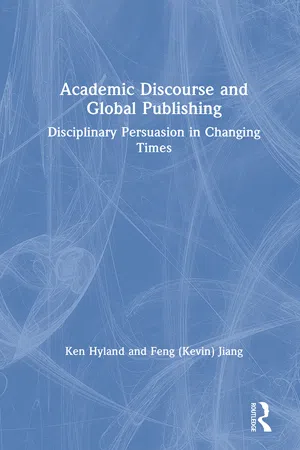
eBook - ePub
Academic Discourse and Global Publishing
Disciplinary Persuasion in Changing Times
This is a test
- 262 pages
- English
- ePUB (mobile friendly)
- Available on iOS & Android
eBook - ePub
Academic Discourse and Global Publishing
Disciplinary Persuasion in Changing Times
Book details
Table of contents
Citations
About This Book
Academic Discourse and Global Publishing offers a coherent argument for changes in published academic writing over the past 50 years. Demonstrating how published writing represents academics' decisions about how best to present their work, their readers and themselves in the global context of a rapidly shifting university system, this book provides:
-
- An up-to-date reference on contemporary topics in specialist discourse analysis, current research methodologies and innovative approaches to the study of writing;
-
- New insights into conceptual and theoretical issues related to the analysis of academic writing;
-
- An accessible introduction to diachronic research in EAP and a case for the value of the diachronic study of texts using corpus techniques;
-
- A clear overview of how texts work in interaction and how they relate to evolving institutional and political contexts;
-
- Links between the practices of different disciplines and the environments in which they operate, as well as observations on the ways in which they differ.
This volume is essential reading for students and researchers of EAP/ESP and Applied Linguistics and will also be of significant interest to academics and students looking to have their work published.
Frequently asked questions
At the moment all of our mobile-responsive ePub books are available to download via the app. Most of our PDFs are also available to download and we're working on making the final remaining ones downloadable now. Learn more here.
Both plans give you full access to the library and all of Perlego’s features. The only differences are the price and subscription period: With the annual plan you’ll save around 30% compared to 12 months on the monthly plan.
We are an online textbook subscription service, where you can get access to an entire online library for less than the price of a single book per month. With over 1 million books across 1000+ topics, we’ve got you covered! Learn more here.
Look out for the read-aloud symbol on your next book to see if you can listen to it. The read-aloud tool reads text aloud for you, highlighting the text as it is being read. You can pause it, speed it up and slow it down. Learn more here.
Yes, you can access Academic Discourse and Global Publishing by Ken Hyland, Feng (Kevin) Jiang in PDF and/or ePUB format, as well as other popular books in Languages & Linguistics & Linguistics. We have over one million books available in our catalogue for you to explore.
Information
Table of contents
- Cover
- Half Title
- Title Page
- Copyright Page
- Table of Contents
- List of figures
- List of tables
- Preface
- Acknowledgements
- PART I: Academic discourse and rhetorical change
- 1. Publish and prosper: The changing face of academic life
- 2. Understanding language change: Corpora, contexts and rhetoric
- PART II: Changes in argument patterns
- 3. A multidimensional analysis of change
- 4. Changes in cohesion and coherence: Let’s look at this
- 5. Points of reference: Changing patterns of citation
- 6. Changes in self-citation: Cumulative inquiry or self-promotion?
- 7. Bundling up: Changes in multi-word combinations
- PART III: Changes in stance and engagement
- 8. Evidentiality, affect and presence: Changing patterns of stance
- 9. Changes in a stance marker: Evaluative that
- 10. Representing readers: changes in engagement
- 11. Changes in the rhetorical self: A profile of we
- 12. Is academic writing becoming more informal?
- PART IV: Epilogue
- 13. Pulling it all together
- References
- Index